Integral Ecology
The last General Chapter 2024, insists on the commitment to foster an integral lifestyle that incorporates justice, peace, and care for creation in all dimensions of personal and community life, contributing to the construction of a more just and sustainable world for future generations:
- Caring for our common home is a shared responsibility that invites us to reflect on our actions and their impact on the planet.
- As a Congregation we are called to walk together in the search for new strategies to help us ensure a sustainable future.
- Let us commit ourselves to small, daily actions to sustain our common home, so that together we can generate positive change by moving towards an integral ecology.
Source: Document of the 56th General Chapter – 2024
 From Brazil
From Brazil
 Desde Colombia
Desde Colombia
Justice, Peace and Integrity of Creation: a style woven by Marie Poussepin that forms and transforms
Justice, peace and the integrity of Creation constitute a formative pillar that plays a vital role in our path of transforming our lives to “imitate the life our Lord lived on earth” (R I), guided by the Dominican charism of Marie Poussepin.
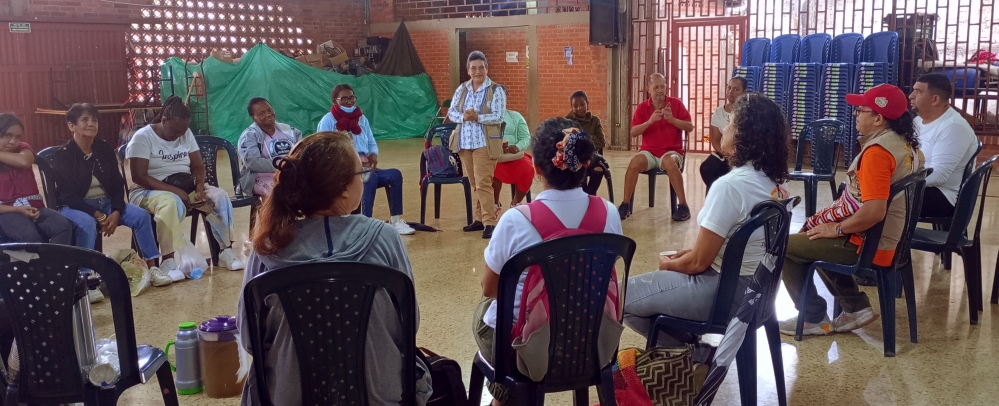 From Colombia
From Colombia
Like Jesus, she encourages us to take part in God's work through a process of change, compassion, mercy, and liberation. She invites us to turn our gaze inward and, from there, to nurture the gifts, skills, and abilities the Creator has granted to each of us. Let us enter into the experience of the style woven by Marie Poussepin:
- Living a lifestyle centered on the service of charity, grounded in the transversal axis of Justice, Peace, and Integrity of Creation, reflects the deep connection between human beings and nature. This way of life involves choosing a style rooted in love and service. “The reason for the community's existence is the service of charity” (R I). This choice confronts us with our vulnerability in the face of human, communal, and social realities, highlighting the need for greater personal and communal development, and for perceiving the earth as a common home for all humanity.
- Environmental protection — as well as protection of the human environment — is understood as a “culture of care, a path to peace, essential for eradicating the culture of indifference” (Pope Francis, World Day of Peace, 2021). In this way, we care for our common home, a gift from God and a treasure for humanity. From this perspective of integral ecology, as a Congregation we are called to walk together in search of new attitudes and practices that contribute to preserving a sustainable future (56th GC, 2024).
- The fabrics of Dourdan that reach Sainville become a lifestyle that expresses the culture of encounter and care, establishing a connection with the Divine, where “caring for our common home is a shared responsibility” (56th GC, 2024). This perspective places us in a filial relationship, trusting that the Providence of God is revealed first through the gifts granted to each person. Love for Jesus, the foundation of all consecrated life, finds its center in following Christ; it embraces all dimensions of life, harmonizes them, and gives each one its rightful place (Charismatic Plan).
- In the style of growing in fraternity (56th GC, 2024), we lift our eyes to creative fidelity (C 82). In building community from the spirit of welcome as a gift from God, we confront our lives, understand humanity's aspirations and history, and in doing so can respond with boldness and passion to the cries of the new poor (56th GC, 2024), in the midst of the cultural diversity in which we live and proclaim Jesus Christ (Charismatic Plan 2024).
This is a lifestyle aimed at globalizing solidarity through everyday simplicity. Thus, God is revealed as a compassionate Father in recognizing our vulnerability; for this reason, He sent His Son: “God so loved the world that He gave His Son” (Jn 3:16). His mission is to come close to us, become our brother, and support us through the love that comes from the Father, acting as bridge and path. This way of life, and the deep sense of solidarity, inspired Marie Poussepin to respond to the call, leading her to embark on the exodus “from Dourdan to Sainville, where ignorance was great” (IP). There, charity excludes no one, although the poor are given preference and special attention (R XXXVII).
What does it mean for us today to leave Dourdan, a prosperous place, to move to the small communities of Sainville? In this context of new forms of poverty, it is there that we can live out our solidarity with the most in need, in the constant search for justice (C. 27). This gesture becomes a powerful form of testimony, revealing our consecrated life and generating hope in the processes of human dignity and promotion, so that we may proclaim with the psalmist: “The Lord is my shepherd; I lack nothing” (Ps 23:1). Thus, the fabrics of Dourdan become a living legacy of God’s Providence, the miracle of Sainville, a life woven from simplicity, knowledge, and the freshness of the Gospel’s message.
Text: Sr. Edilma Ardila, member of the JPIC team
Migration, a reality taken on compassionately
The reality of migration in Venezuela today: a reality suffered by our brothers and sisters, and assumed compassionately by consecrated life and Red Clamor Venezuela (Latin American and Caribbean ecclesial network of migration, displacement, refuge and human trafficking). A reality suffered by our migrant brothers and sisters. Why migration in Venezuela? Because of the situation in the country; they are looking for a better future, a better quality of life, there is fear in the face of so much violence and insecurity, lack of food and medicine, precarious basic services: in most states they live without electricity, water and domestic gas. On the other hand, public education has been reduced to two days a week or three hours a day so that teachers and professors can find other jobs to help support their families. Hundreds of thousands of retirees and professional pensioners do not have enough for daily food and medicine; indigenous Venezuelans currently have the highest rate of malnutrition in recent history; public sector workers earn less than 10%.
We are immersed in an unprecedented economic crisis as the State is in misery, and Venezuelan society is infinitely poorer, poverty robs us of hope, the lack of education creates chaos and confusion, the demand for cheap labour and the demand for commercialised sex, impunity and lack of justice make us vulnerable to the disrespect of our legitimate rights, creating a lack of options for the Venezuelan people, which puts the majority at the mercy of forced migration and voluntary surrender to traffickers and traffickers.
What are the consequences for Venezuela?
Fragmented families resulting in those left behind: Children and older adults, mostly left alone in their homes...
How does it affect migrants when they arrive in another country?
The majority of migrants leave without documents because they do not have access to them, as any documentation is unattainable due to the high cost; this reality is aggravated when they manage a job and because they are not legally employed, they run the risk of being exploited at work and threatened because of their illegality, sometimes they are not paid and they are dismissed with nothing... They are used and dismissed when they have already made use of their strength and abilities. Another reality that our migrant brothers and sisters suffer as a result of not having the required documentation is forced begging.
A reality taken on compassionately: by the consecrated life and the Red Clamor Venezuela.
We take the providential opportunity to consolidate alliances with church organisations in the country that make up the Clamor Network with a clear perspective on the mission of welcoming, protecting, promoting and integrating migrants, displaced persons and refugees at risk of becoming victims of human trafficking.
Our goal is to create a team of interdisciplinary facilitators who will be on permanent mobility for a year, accompanying the 19 houses of passage for migrants and returnees that we have in the country, as well as schools and services where we serve and work with the vulnerable population, training and informing, so that they are able to assume and integrate into their daily lives, knowledge on migration, its causes and consequences.
We also want to make visible the difficult situation experienced by migrants who have been victims of trafficking or other hate crimes, to share experiences to learn about the forms of recruitment and exploitation developed by traffickers and exploiters, as well as the routes they use, both within and outside Venezuelan borders. At the moment, we have started emerging courses to promote work with the aim of avoiding migration and preventing prostitution, or any situation that puts people's lives and dignity at risk.
This is a significant experience where synodality becomes a reality, since the Congregations present have their structures at their disposal to make this project possible, which is not ours, but God's, who today asks us to respond from our shared charisms so that "all may be one and the world may believe". There is no other way in our time but the synodal way where we can dream with our eyes open and our feet on the ground, making the Kingdom of God possible in the joy of serving and giving life in community.
All this reality helps me to evoke Marie Poussepin who let herself be surprised by God to respond to the reality of her time, forming in the prevention and care of the lives of so many young people who were at risk, teaching them "to work for a living and to make them capable of avoiding the disorders to which misery and ignorance expose them" (IP). She responded to the urgent needs of her time and formed the community to carry on with her sisters the work of God...We too today are called to continue "in an attitude of permanent conversion in order to live with audacity and prudence the project of Marie Poussepin" (Cfr. 550 GC 2019. P. 25... "to face the risk, to reorient our presences, to change what is necessary, to rekindle the fire of the Spirit and the passion for our own vocation" (550 GC 2019. P. 22).
Text: Sr. Nícida Díaz Leal
Reflection on Justice
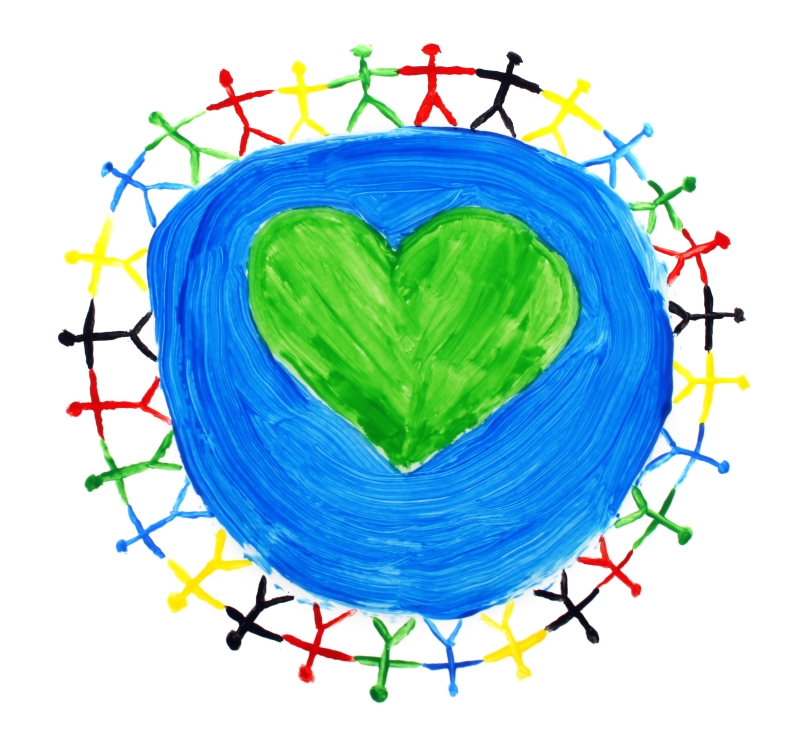 The reality of our broken world demands of us a response to justice, which becomes a continuous and intense search for causes. In every General Chapter, Provincial Chapter, Enlarged General Council (EGC), this theme resounds with demanding generosity, reaffirming our commitment to JUSTICE, PEACE AND INTEGRITY OF CREATION, to combat against all forms of violence, poverty and to defend above all the dignity of the human person, giving priority to the option in the peripheries, where "life cries out".
The reality of our broken world demands of us a response to justice, which becomes a continuous and intense search for causes. In every General Chapter, Provincial Chapter, Enlarged General Council (EGC), this theme resounds with demanding generosity, reaffirming our commitment to JUSTICE, PEACE AND INTEGRITY OF CREATION, to combat against all forms of violence, poverty and to defend above all the dignity of the human person, giving priority to the option in the peripheries, where "life cries out".
We enter into the heart of the Congregation, and Marie Poussepin allows us to look into the soul of a woman matured in suffering, in family and social responsibilities faced with courage, with severe intelligence and reflection that made her love and admire by her contemporaries. In 1696 she left her homeland in Dourdan and moved to the small village in Sainville, 17 km away. The journey way is open. Let us discover the project, it is a real process which is becoming a reality and at the service of God's project in the history of her time. She opened new paths by levelling education, opening schools for boys and girls, she broke structures to give work possibilities, she took the direction of the industry, silk weaving by hand was not prospering, but she had a vision of the future and continued to weave silk and woollen stockings with machines.
Many young apprentices, almost children, benefited from the intelligent charity of Marie Poussepin, who was capable of foreseeing, organising and who knew how to go beyond Christian justice, to the point of not charging for their teaching and providing them with room, laundry, food... all from a sense of Providence, she established among them a healthy emulation in paid work, a pedagogy unknown in her time, this is true justice. She does not stop with just the techniques, she goes further and acquires new commitments with the most fragile and teaches them to read and write, and even more, she does it at the personal and group levels. Honestly, she produces what it needs to live on, and it she is worthy of admiration for the training and human promotion plans for young apprentices, charity through work is already its magic formula which is equal to justice in the service of the most disadvantaged. Honest work, the heritage and hallmark of her family, has already opened up a path in her life, work as an instrument in the service of justice through her immense charity. She continues to dream, she sees the possibility of establishing more schools, a dispensary, rooms for weaving, and she clearly says: for the benefit of the parish, the instruction of the youth and the service of the sick poor, she has a broad mind to respond justly to the needs with all that charity can inspire in her.
Sisters, we are urged to work for equality so that women can develop their abilities and put them at the service of others, let us not pass by and let us dwell on the parable of the Good Samaritan who always gives of himself (Lk 10, 33-34), who is moved, draws near, sympathizes, consoles, heals, cures, loves, these are acts of suffering with the other, he becomes close, he assists him, he carries him, he cares for him, the Samaritan goes down and here it happens that a descent takes place that carries a deep meaning for a liberation, Jesus emptied himself taking the condition of a servant, he humbled himself to the point of death and death on a cross (Phil 2,6-8). Christ's compassion is inserted into the heart of the wounded human being.
We need to become agents of change, and we need to participate in movements that generate awareness, we enter with Laudato Si, in that environmental awareness. We need a change of heart to confront resistance and to look gratefully at creation, to let ourselves be touched by its broken reality, without fear, to make changes in our way of life and to be where life and justice cry out.
Let us try to repair the damage done to the most vulnerable and to the earth itself.
Let us try to re-establish broken relationships and be open to dialogue to work with others.
Let us try to value what we have received and learn from so many of our sisters and others with whom we share the mission, to transform our existence in order to preserve the gift of life.
Marie Poussepin "saw what was right in the eyes of the Lord and did it", consistent and worked 100% for the dignity of the poorest. Her relationship with God, with creation and with others was sincere, daring and generous.
Let us act justly in the face of migration, displacement, human trafficking, inequality, slavery of women, euthanasia, for impoverished and exploited peoples, for economic impacts that do not prioritise life.
Let us try to preserve, repair, welcome, any risk that could violate human rights.
The Congregation is involved in the task of justice, there are many sisters and collaborators who accompany communities in the process of development with multiple projects where vulnerability prevails, where we try to protect, welcome, promote sustainability as an essential condition for the future, where justice and peace open possibilities for peace processes, facilitate mediation and be able to reach a reconciliation with God, with nature and with others, heal the wounds of great suffering, break down borders to bring us closer together.
We have inadequacies, let us recognise them. Our union with Him allows us to "make all things new". (Rev 21,5)
We need to speak often of God and with God, to renew frequently the intention to do everything for his glory, and to rescue our brothers... Everything at the service of the most disadvantaged, seeking with them and providing what is necessary without being assistentialist, unwavering in faith, firm in hope and generous in compassion in justice, even in scarcity do not cease to do charity; in conversations at work today this is not a routine but a pressing need.
How not to end this reflection by recalling: "I desire and recommend with all my heart that you maintain zeal for the instruction of poor children, both spiritually and temporally, the spirit of poverty and the love of work" (Marie Poussepin Testament).
Justice and peace, a lifestyle
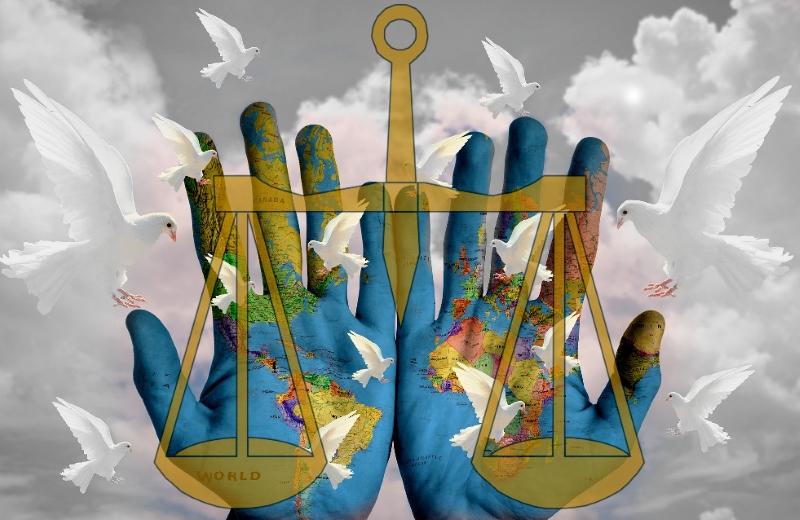 “The 55th General Chapter 2019, insists on the commitment to:
“The 55th General Chapter 2019, insists on the commitment to:- Justice, peace and the care for creation as a lifestyle that expresses our preferential option for the marginalized, impoverished and those unnoticed in our societies.
- Continue to work for the care and defense of life in its integrity, with fundamental ethical options and to protect the environment, through experiential eco-pedagogical processes that require personal, community and missionary commitments that can be evaluated.”
Source: Document of the 55th General Chapter - 2019
The majority of Indigenous Peoples continue to be “bent over”
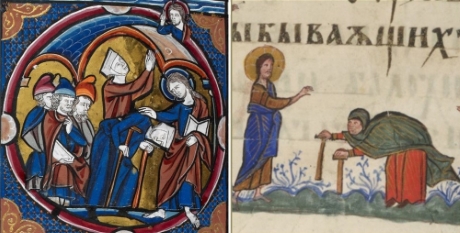 "One Sabbath, Jesus was teaching in a Jewish meeting place, and a woman was there who had been crippled by an evil spirit for eighteen years. She was completely bent over and could not straighten up. When Jesus saw the woman, he called her over and said, “You are now well.” He placed his hands on her, and right away she stood up straight and praised God." (Lk 13, 10-13)
"One Sabbath, Jesus was teaching in a Jewish meeting place, and a woman was there who had been crippled by an evil spirit for eighteen years. She was completely bent over and could not straighten up. When Jesus saw the woman, he called her over and said, “You are now well.” He placed his hands on her, and right away she stood up straight and praised God." (Lk 13, 10-13)
I would like to linger a bit on some points of this beautiful text so encouraging to everyone. The words “that had crippled her for eighteen years...bent over, and quite unable to stand up straight”. I ask myself: What are eighteen years for a woman? Her whole life. It is an imperfect time; I don’t know why, but I think in the number 6x3, maybe a bit exaggeratedly, but I would say it is the total imperfection. This woman was completely imperfect in the eyes of the world, and what is imperfect does not merit to be payed attention to, but rather left discarded, and missing. I think of so many men and women who are in these same circumstances who we see as imperfect, because of religion, social condition, color, raze, ideas, inability or capabilities...
It is incredible, if we continue to look for which is the imperfection in our world, those we see, or what things we see as imperfect. Our world makes us see that what is imperfect does not have a place. In this text, it is not only the time, symbolic or not, what has plays a role, it is also the fact that the woman is bent over. What does it mean for us the term “bent over”? If we had the experience of being bent down, it would lead us to become aware that we can only look at the ground and a bit around us, but physically we could not see beyond that. What actually happens in our world with the peoples, who in spite of globalization, modernity and advanced technology continue to be poor and marginalized, suffer from hunger and continue in a situation, not only intellectually but economically and socially dominated. They continue to be bent over.
In our rural and indigenous world, in spite of the cultural richness of the Mayan people, Tsotsiles, Tseltales, we see that as much the men as the women are bent over because they cannot yet have access to their human rights as persons. They are tacitly denied all what a good life entails: education, health, property and food production. It is a type of remaining ‘bent over’ as they can observe all what modernity brings but cannot straighten themselves up and benefit from the day-to-day world innovations. Indigenous peoples take it as a natural thing to bow as they are used to live that way. The experience of hearing them say “I don’t know”, “I don’t know how to think”, I don’t have a thought”, are phrases which make us discover that even in the XXI Century, the great majority of Indigenous peoples continue to be “BENT OVER”. Too many aspects make them so: marginalization because their languages are considered as folkloric, also their clothing, customs and celebrations. They are not allowed to see beyond all of these, rather, they are kept into a certain attitude of shame for speaking their language, or to continue on with their habits and vision of the cosmos. Now, what about Jesus? Jesus goes to the Synagogue on Saturd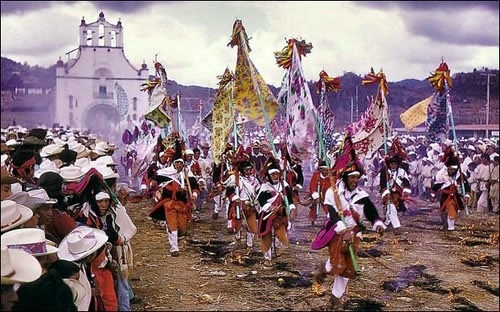 From Mexicoay and He sees the “bent over woman”. His sensibility and compassion seeing a daughter of God for so many years in such state is huge. Jesus, has no blocks, He is not bent over, his relationship and closeness to the Father makes him be erect, upright and allows him to see beyond himself, to discover the reality around him; it allows him to see the need in the other, to discover that others live in suffering, they experience marginalization, loneliness, isolation, inferiority... It makes him compassionate, loving and supportive as his Father is, to trust in that daughter of God who has a right to be happy and to see the world as He sees it.
From Mexicoay and He sees the “bent over woman”. His sensibility and compassion seeing a daughter of God for so many years in such state is huge. Jesus, has no blocks, He is not bent over, his relationship and closeness to the Father makes him be erect, upright and allows him to see beyond himself, to discover the reality around him; it allows him to see the need in the other, to discover that others live in suffering, they experience marginalization, loneliness, isolation, inferiority... It makes him compassionate, loving and supportive as his Father is, to trust in that daughter of God who has a right to be happy and to see the world as He sees it.
It is at this time that Jesus calls the “bent over woman”, touches her and says to her: “woman, be free of your sickness”. Many years had passed during which she had no hope, and had gotten used to live that way... such as many Indigenous peoples have gotten used live... And now Jesus comes and says to them, as He did to the woman: “you are free from your impairment...” He touches her and she becomes upright...What a joy! Only a word was enough for her to be healed! Just a word from Jesus heals. Similarly with the Indigenous peoples, one word is enough for the people to become upright and to walk, to discover all what God has given to humans and which they can admire, enjoy and discern what is the best for them to improve their li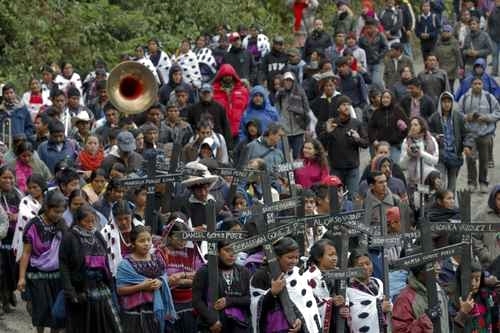 From Mexicoves and to have a truly good life”. Each group of people may ask itself if God has called and touched it, if He has said: “be free”, and in becoming upright see a different and marvelous panorama. Discernment then follows, to see what is it that gives life and what is it that causes death... each nation has the opportunity to see Jesus, to experience him and to live as He experienced his Father. The challenge is for everyone without discrimination or rejection to repeat: “Rise up, shine forth, for the light, the glory of the Lord dawns over you” and to walk transformed by Jesus, to be better nations and better Christians!
From Mexicoves and to have a truly good life”. Each group of people may ask itself if God has called and touched it, if He has said: “be free”, and in becoming upright see a different and marvelous panorama. Discernment then follows, to see what is it that gives life and what is it that causes death... each nation has the opportunity to see Jesus, to experience him and to live as He experienced his Father. The challenge is for everyone without discrimination or rejection to repeat: “Rise up, shine forth, for the light, the glory of the Lord dawns over you” and to walk transformed by Jesus, to be better nations and better Christians!
Personally, I could ask myself, how many years have I been bent over? How many years have I lived just seeing the tip of my nose? How have I discovered I am bent over? Why? There could be many reasons, many ideas, thoughts, actions... fears, visions. But I have someone who can straighten me up... someone to whom many times I don’t listen, don’t see and don’t experience... Why don’t I make silence within me? Or listen within my heart? Maybe deep within I may hear the voice of God who says to me: come closer that I may touch you. He wants to heal me... Maybe it is not within me but someone whose word motivates me to see beyond myself... to go to the other, to see the needs of others, their concerns, joys and hopes... Or to take His Word, so as to break it open and to find in it the message of life which God gives us.
Jesus, you are the one who calls me, touches and heals me, I thank you for showing yourself at all times through the persons, the events and your Word. Today you invite me to look at my inability to stand up straight, to acknowledge that only by letting myself be touched by you can I stand upright and see the world the way you have made it, not as we have turn it. It is, therefore, a challenge for me to discern God’s call day by day and to let it transform my life.
Text: Sr. Dorys Gilma Zorro
Migrants and refugees: men and women in search of peace
Source: Message of Pope Francis for the World Day of Peace - 2018
Some spiritual drops for Justice, Peace and Ecology
Charity versus charitable actions
Every time I reflect on Charity, I see a world where there is so much of misery among the poorest: the beggars, drug addicts, alcoholics, women denied of their dignity, boys and girls wandering in the streets, men and women looking in the garbage for something to eat, young ones without a purpose of life, refugees, immigrants and sick people and wars and desolation.... This is the reality offered to us as daily bread... How Marie Poussepin would have responded to such a misery, solitude and suffering?
A small but serious walk through the sources of our Congregation
Misery and Mercy embrace each other
Dourdan had fallen into the hands of misery and her companions were hunger and epidemics which knocked at the door day after day... Marie Poussepin is not only ready to help but she goes to the extreme of receiving the miserable people into her own house: “She was not only happy to help Marie Olivier, a sick and poor widow, but she brings her to her own room and takes care of her until her death.” She does not do a favor, even less a charitable action but on the contrary, she does a heroic action inspired by charity: to treat the poorest with Mercy and dignity. In the humble village of Sainville “ravaged by war, famine and epidemics, and where “ignorance was widespread” Marie Poussepin sees the faces of many girls without home and without help, young ones without instruction and means of support and the sick ones without anyone to assist them and take care of them. Marie Poussepin is not only moved but allows herself to be inspired by Providence to respond to the misery of those in need with works of Mercy... She “has taken with her young country girls without either shelter or resources to raise them in the fear of God, and to teach them to work and earn a living, so that they might avoid...the disorders to which destitution and ignorance tend to lead...” (Original Vision)
From charitable action to service of Charity in the 21st century
Christian spirituality cannot have other paths than those of Mercy.
To be a Christian and to be faithful to the Gospel in the 21st century is nothing but to commit ourselves to live mercy to the full extent. "Oh we are merciful or we are not Christians."
“The Works of mercy cannot be considered as a custom”.1 Even more at this time when it is not easy to find Mercy in our world where there is so much indifference, individualism and a compulsive passion to protect our structures without recreating them, to be centered on ourselves and to look for ways to survive, while our brothers and sisters have neither food, nor strength to cry out and make their voices heard. We have to have a contemplative look and a vision of faith to discover the hidden God who dwells in our homes, streets, squares and schools. “We must examine this more closely in order to enter into a dialogue like that of our Lord and the Samaritan woman at the well where she sought to quench her thirst... there are also many “non-citizens”, “half citizens” and “urban remnants” (EG 72.74).
“God overcomes misery with mercy. This is why God became man. And we the human beings make ourselves more humane with Mercy and the more we make ourselves humane, the more we resemble God who became man...The dogma of our faith: “God became man”, has a correct understanding on saying: Mercy became man. The world thus begins to be the Kingdom of God”.2 This is the dynamics that we must incarnate in our life so that our actions will not be converted to just a favor granted, or an act of charity, but to a heroic action inspired by the Providence of God who asks us: Where is your brother? Or tells us” You yourself give them to eat.”
* 1 and 2: Carlos Bazarra, "Vivir la Misericordia".
Text: Sr. Nícida Amparo Díaz
God is not indifferent! God cares about mankind! God does not abandon us!
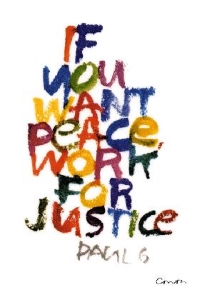
"At the beginning of the New Year, I would like to share not only this profound conviction but also my cordial good wishes for prosperity, peace and the fulfilment of the hopes of every man and every woman, every family, people and nation throughout the world, including all Heads of State and Government and all religious leaders.
Source: Message of Pope Francis for the World Day of Peace - 2016


 EN
EN  ES
ES  FR
FR 



